Turns out protein is not just a fad. It’s time for all retailers to get in on the products that now appeal to a wider variety of convenience customers
No added sugar, gluten-free and high protein have become such mainstream nutritional call outs that it almost seems that NPD isn’t worth releasing unless it can boast one, or all, of these claims. There has been an astounding amount of high-protein NPD in the past few years, much of which has been targeted towards the all-important Millennial generation we’ve been hearing so much about.
On average, UK consumers have increased their consumption of protein by 2.2% since 2013 (Kantar Worldpanel 52 w/e 13 August 2017), and this is predicted to continue as one in five UK adults are looking to increase their level of protein intake (Leatherhead Food Research August 2017).
The want for high-protein content foods has been driven by the growth in healthier, active lifestyles, with one in four Brits now using a sports & health nutrition product regularly (Euromonitor November 2017). Consequently, the UK sports & health nutrition market is growing at 68%. Of this, protein-based nutrition is the biggest sub-segment, driving 82% of value sales (within sports & health nutrition). Protein bars are the key driver of this growth, growing the category by £18m, at a rate of 77% (IRI Market Place, Total UK, sports & health nutrition, 52 w/e 3 December 2017).
After witnessing the popularity of protein products first hand, Donna Mullan, of Mullan’s Spar, expanded her protein range last year to a one-metre standalone fixture of seven shelves, located next to the coffee machine.
She says: “Right from the start we noticed that protein bars were flying out and people were picking them up alongside their coffee.
“We used to have chocolate bars, cakes, donuts and pastries next to the coffee machine as that’s what people used to pick up, but now we have moved healthier cereal bars and protein bars there and that’s proving far more popular as people are so much more conscious of the sugar content of foods. Not only are protein bars seen as having more nutritional value, but they are much easier to eat on the go and probably more filling as well. You can imagine if someone needs to pop one in their suit on their way to their next meeting, they don’t want to show up with pastry flakes all down them.”
The convenient option
Growing shopper demand for functional drinks in a convenient format is really good news for convenience retailers, according to dairy drink Nurishment.
“Dairy drinks such as Nurishment, which also act as a ‘gap filler’ in a convenient format, are ideal for consumers who lead busy lifestyles, or who are simply looking for added nutrients in a ready-to-drink, tasty format. As such, they represent a major profit opportunity for retailers,” says Nurishment brand manager Catherine Pillinger.
Nurishment is the UK’s number one nutritionally-enriched milk drink (IRI, UK Afro-Caribbean Food & Drink Category – 52 w/e 9 December 2017) and provides consumers with vitamins, minerals and calcium, and as much as 20g of protein per drink.
“Flavoured milk shoppers are now much more aware of the role that functional drinks can play in their lives,” adds Pillinger.
“Taste and flavour will always be important, but consumers want these drinks to do much more than quench their thirst,” she says. “They’re looking for brands such as Nurishment to help them maintain their busy lifestyles and provide them with the much-needed nutrition that keeps them on the go.”
Nurishment hopes awareness of its brand will reach an all-time high this year after recruiting England and Liverpool footballer Daniel Sturridge as its first brand ambassador.
Sturridge is currently taking on the nation’s gamers in The Nurishment Filling Station, the brand’s first dedicated gaming app.
Healthy eating
Pavan Chandra, senior brand manager at Peperami and parent company Jack Link’s, agrees that the awareness of protein has stemmed from the increased interest in eating healthily overall. He says: “Healthy diets have become embedded in the UK’s eating habits, resulting in an evolution of the types of products we purchase. Protein is widely seen as healthy, and its role has evolved from niche muscle-building to having a broader everyday appeal where energy and vitality feature – particularly so for millennial males.”
Nick Morgan, lead nutritionist at Bounce Foods – maker of healthy and high-protein ball-shaped snacks – points out that high-protein snacks generally should offer better nutrition. He says that the high-protein content of bounce balls (about 10g) isn’t about feeding big body builders or following a trend, but explains that protein is an essential macro-nutrient, and a food with a high proportion of protein should therefore have a lower proportion of carbs and fat.
He adds that while other snacks might label themselves as ‘healthy’ they often don’t offer great nutritional value.
Debbie Epstein, marketing director for Bounce, says that the convenience market is the brand’s key market as the balls make an ideal snack for shoppers on the go and for those on an impulse mission. She adds that it is important for retailers to make it clear that just because a product is high in protein doesn’t mean it is only appropriate for body builders and the gym-obsessed.
“We’ve just had a full product rebrand to make our packaging clearer and more inviting. We’ve stripped it of all the excess information and provided a picture of the product on pack so people know exactly what they are buying. We don’t want people to see the word ‘protein’ and think it’s not for them, as our range of flavours offers a snack appropriate for a range of occasions, whether that’s a lemon & coconut ball to replace a slice of afternoon cake or a cacao mint ball to replace an after-dinner treat.”
Battle Oats cuts sugar and fat content
The Battle Oats protein snack brand has enjoyed sales growth as a result of protein becoming a more mainstream trend.
Kevin Smith, co-founder of the Humberside firm, says: “Over the past four years, demand for our products has really taken off as people have become more aware of the importance of healthy protein snacks. Having started as a post-exercise product, we are increasingly seeing active mainstream consumers turning to our high-protein flapjacks because they are more nutritious.”
The Battle Oats range of high-protein flapjacks was relaunched at the beginning of this month with a new recipe with up to 65% less sugar.
The new recipe will see the sugar content of the range drop to 5.6g of sugar per 70g bar, and fat per bar fall by up to 30%, giving a 15% drop in calories to make the bars come in at less than 300 calories.
The brand has also extended the range with the addition of a new cookies & cream flavour.
The range now comprises six flavours of oat bars: white chocolate coconut; cranberry & blueberry infusion; double chocolate brownie; dark chocolate chip; cherry bakewell; and the new cookies & cream flavour.
Smith says: “With pressure on food manufacturers and retailers to provide more low-sugar options, we decided to invest in reviewing our oat bar recipe to see if we could reduce the sugar, fat and calorie content even further. Having worked with a team of top nutritionists, we have achieved this and, in fact, our flapjacks now contain less than a third of the sugar content of the leading oat nutrition bar, showing that even with so-called healthy snacks, it’s still vital that consumers read the nutritional information.
“We’re hoping to partner with more outlets such as convenience stores and garage forecourts to make these healthy snacks more widely available to the growing grab ‘n’ go market.”
Battle Oats also developed a new protein cookie product last year, believed to be the only protein cookie on the market that uses plant-based protein and is both gluten-free and vegan.
Former professional rugby player Rory Lawson founded protein coconut water brand Coco Pro and agrees that protein products should be marketed to shoppers who are health- and nutrition- conscious as opposed to the body builders of the world. His Coco Pro drinks are predominantly aimed at men and women aged 24-35 and he’s working on a vegan SKU to appeal to that growing audience.
The soft drinks category has been greatly influenced by the protein phenomenon. 2017 saw sales of protein RTDs rise 14%, making them the second fastest growing category in sports nutrition (Euromonitor Sports Nutrition in the UK 2017). Ready-to-drink protein is growing faster in convenience than in any other channel as symbols and independents hold a 30% share of protein sales and are the fastest growing route to market (IRI Marketplace Data 52 weeks unit & value sales to 29 January 2017).
Robert Eggo, area manager of Spar Roe Lane, Southport, says that USN, Fuel10K and Weetabix protein products all sell well in his store. He says this has been the case in student areas for the past couple of years, but he now sees the trend as mainstream. In his Southport central store, which is shopped by many older adults, it’s a recent trend and they’ve only started catering to it in the past seven months.
“It’s a very new trend for us, but prior to our store having it I’m sure it was already a popular category in university campus shops and in student areas, as this is really the audience that first cottoned on to these products.”
Obvious hot spots for high-protein shoppers are those c-stores close to gyms. One such store is Jet Spar in Selby, Yorkshire, where a gym next door provides a steady stream of customers.
Sales development manager Joe Baker says it was a bit of a guessing game when deciding which new products to start selling during the store’s big expansion and refurbishment last year, but the protein bay has certainly earned its place.
“Of course, before the expansion we didn’t have space for a lot of the products we now sell but we knew that there was the big gym within a very short walk from the store and we discovered the range of USN bars and shakes and thought we’d give it a go.
“When we first started we gave away a shaker with certain protein shakes and that made that product absolutely fly out!
“Without the promotion the products are still very popular and well worth the generous amount of space we’ve given them.”
It helps that the USN logo is visible from the road as they’ve posted it across half of the barriers outside the store – a smart move considering gym goers are likely to be feeling hunger pangs just as they drive past the store.
Tasty snacks with an added bonus
Protein Dynamix says demand for healthier snacks that boast good nutritional profiles and which don’t compromise on taste will be a key growth area in 2018.
Dave Christie, sales director at the company which makes protein powders, snacks and capsules, sees particular growth in protein bars, driven by consumer demand. He explains: “Traditionally the reserve of fitness enthusiasts, they are now a mainstream staple as snackers understand the importance of protein in keeping you fuller for longer between mealtimes, and consider them as an alternative to traditional chocolate bars which can have up to 20g more sugar per bar.”
Christie adds that the company’s Staxx protein bars are gaining traction in the convenience sector, adding that this brand will soon introduce its fourth flavour: dark chocolate & mint. This flavour will sit alongside chocolate caramel, cookies & cream and peanut & caramel.
Rick Asiyani, head of marketing for Staxx bars, adds: “Taste and choice are key when it comes to protein bars. Protein bars have changed from the powdery, chewy, artificial-tasting options that were the norm for too long. We have worked tirelessly to produce a range of bars that are a genuine joy to eat and a real alternative to high-sugar chocolate bars.”
The brand is being backed by a £1m marketing campaign this year to continue to boost brand awareness following nationwide field sales activity at the end of 2017.
Christie adds: “We have appointed field sales agents to reach more than 2,000 stores during the launch phase to aid educating retailers on where to place bars in store. In addition, we have produced strong POS to help retailers to place the bars alongside confectionery at till points.”
New year rush
Angela Prescot, store manager at Spar Roe Lane, says she saw sales of protein bars shoot up in January when they had USN bars on offer at just £1 each, and sales have been good since.
She adds: “I’ve also noticed a lot of people picking up the USN protein flapjack bars first thing in the morning. I don’t know if they’re going to the gym at that time, or whether they’re simply swapping out an ordinary cereal bar with a protein bar as they see the protein bars as being a healthier option.”
Thanks to knowledge that protein keeps us fuller for longer, breakfast is a popular occasion for consuming protein products. This can be seen from the high number of protein-laden NPD which falls into this mission. For example, Fuel10k recently released low-sugar, high-protein porridge pots and nut butter pouches tailored to on-the-go breakfasts.
Barney Mauleverer, co-founder of the brand, says: “Our own research found that 68% of consumers are concerned about sugar levels and a further 58% are looking for more protein in their diet (Fuel10k consumer questionnaire, 750 respondents, November 2017). We’re targeting those whose needs are not being met by traditional cereal providers, focusing on their dietary needs by cutting the sugar and adding a dairy-free option.”
As this trend goes hand in hand with healthy eating, many manufacturers are trying to capture as many dieting needs as possible and creating protein products which are natural, low in sugar, gluten- free, dairy-free and organic wherever possible. Vegan options are also becoming available as plant-based eating grows in popularity.
Morgan points out that Bounce Balls are gluten-free and the brand offers several vegan options to ensure that it is inclusive to all shoppers.
Bam Life, the team behind the natural, flavoured milk drinks, also recently expanded its range by introducing what it says is the first 100% natural organic RTD protein milk drink. Bam’s Organic Vanilla Protein Milk targets consumers with an active lifestyle, offering 25g of protein per 330ml.
It’s this search for natural protein that has contributed to the UK’s rapidly expanding £100m nut butter category, which has grown by 138% over the past three years (IRI October 2017).
Kirstie Hawkins, Whole Earth brand controller at Wessanen UK, says the rising interest in foods that can support an active and energetic lifestyle has contributed to Whole Earth’s growth, with value sales growing by 16% year on year (IRI 52 w/e 14 October).
“This makes it an incredibly exciting time for the nut butter category,” says Kirstie. “Whole Earth’s market-leading peanut butter is packed full of plant-based proteins – more than 25g per 100g – giving consumers the opportunity to add more protein into their diet through a natural source.
“Peanuts are built from amino acids, known to have many positive effects on the body including helping to build and repair muscle tissue. In addition to protein, peanuts are also high in fibre and contain high levels of unsaturated fat, which is good for heart health and keeping cholesterol levels down.”
The brand has played on its health credentials with its ‘Nature’s Wonder Fuel’ campaign, which focuses on supporting healthy lifestyles with wholesome, all-natural products.
“One of Whole Earth’s biggest draws for healthy consumers is that it contains absolutely no added sugar. Whole Earth’s natural protein content, combined with its other strong nutritional values, makes it the ideal solution for those seeking a wholesome, healthy spread.”
It’s not just peanuts that are appreciated for their natural high- protein content; almond butters have become a popular alternative to peanut butter thanks to their unsaturated fat content and minerals, vitamins and fibre. According to Innova Market Insights, almonds have held lead position for nuts used in new product introductions for 10 years. Emily Fleischmann, senior director of global marketing at the Almond Board of California, says the market place is looking for these products as they align with the growing consumer desire for ‘clean products’ plus, when compared ounce for ounce with other tree nuts, they are the highest in protein, as well as fibre, calcium and other vitamins and minerals.
Vegan virtues
Paul Hargreaves, chief executive at Cotswold Fayre, suggests this interest in natural plant-based protein is only going to increase. “Foods that are high in protein, but not meat, are gathering huge momentum. All sorts of products are being marketed as high protein, but particularly among the snacking category. Similarly, plant-based proteins are predicted to fly in 2018 with the increased demand for high protein foods and rise in flexitarian diets.”
Although these products are often targeted towards younger consumers and gym-goers, even retailers with a predominantly elderly demographic of shoppers are managing to increase footfall and sales with protein ranges. Jerry Tweney, of Prestbury Village Stores in Cheltenham, is one such retailer. He says he was really surprised that this category works in his store.
“I never thought to put these products into my store as this is very much a youngsters trend and this store traditionally is predominantly shopped by residents of about 55-plus. But with these products in place and with our much improved food-to-go offering now in place, we are able to appeal to a younger demographic as well.”
Linda Williams, of Broadway Convenience Store, in Edinburgh, says the store has been selling protein products for about 10 months and they’ve always been popular, but it has been since new year that they have particularly taken off.
“In January people were making an effort to go to the gym more and eat more healthily and so they were buying a lot more of these shakes and bars,” says Linda.
“We have 10 different types of protein bars. The Carb Killa Grenade bars are particularly popular and we sell those at a Premier promotion of £1.79, which is a very good price.”
Grenade is the biggest brand within protein bars, accounting for one in six purchases, and has tripled its share of the overall bar category in one year (IRI Market Place, Total UK, sports & health nutrition, 52 w/e 3 December 2017).
The message from manufacturers and retailers is clear: protein is huge trend which has gone mainstream, but store owners need to stay aware as it is a market that is continuing to evolve rapidly.
Retailers should look out for low-sugar, free-from, natural and organic versions of products wherever they can, in order to capture as wide an audience as possible.



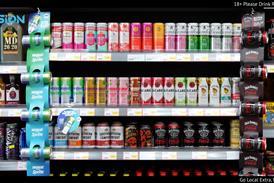

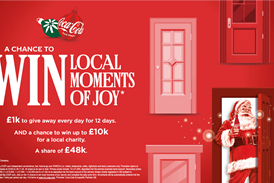



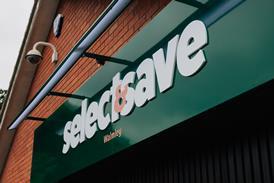






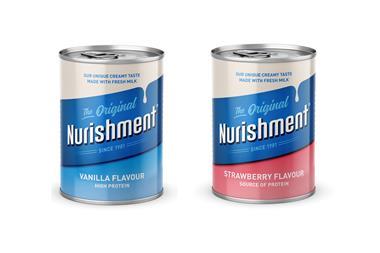
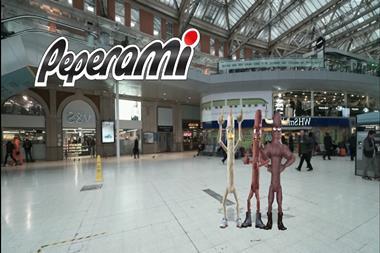

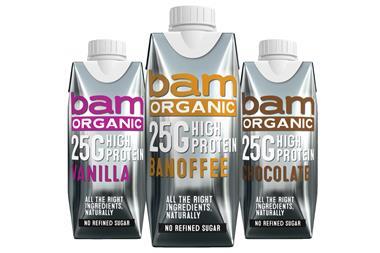
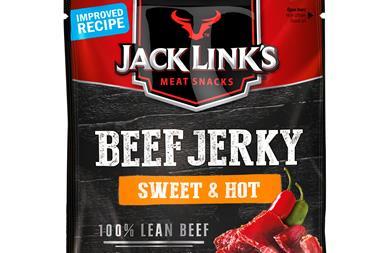
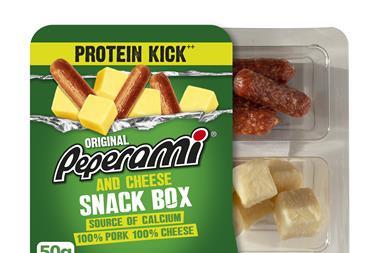

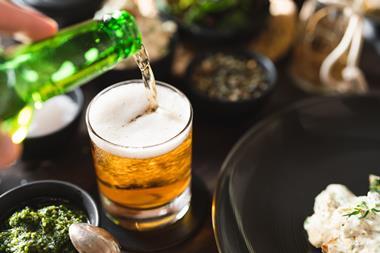



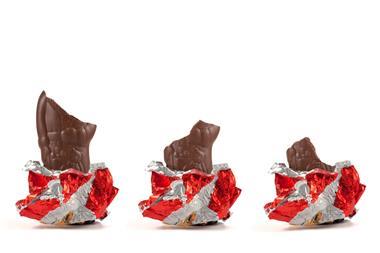
No comments yet